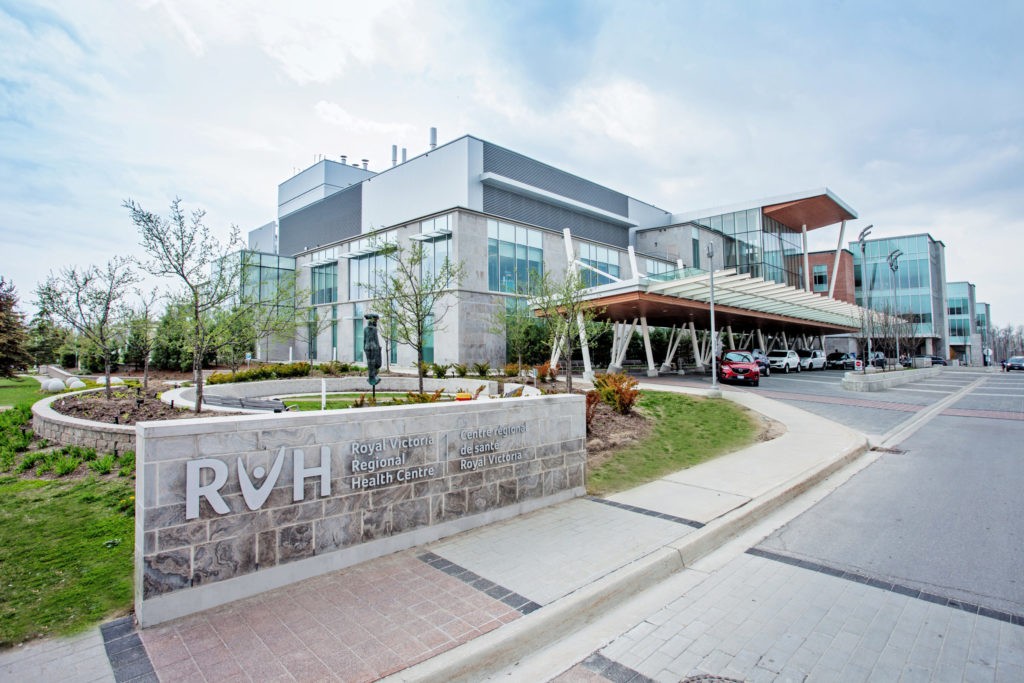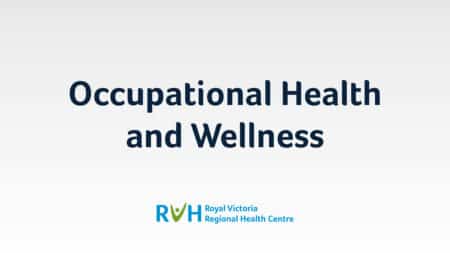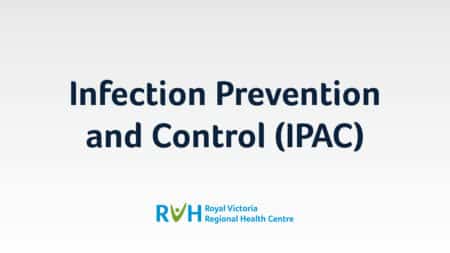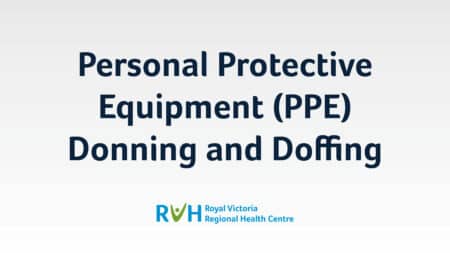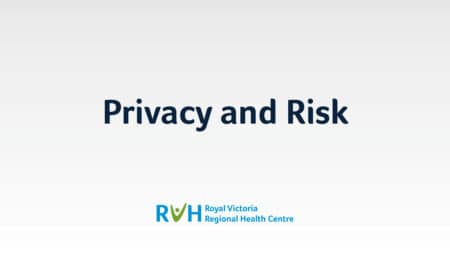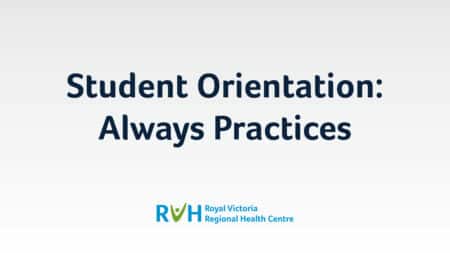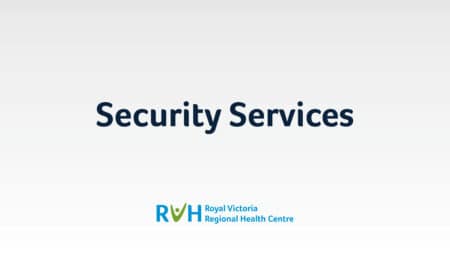Congratulations and welcome to RVH! We are looking forward to having you join TEAM RVH. Please review the following sections for more detailed information as you prepare for your upcoming placement.
Onboarding Documentation Required Before You Begin Your Placement
All students are required to fill out the Learner Attestation Form with your unique ID number, both of which will be provided to you in your onboarding email.
The following documents must be reviewed to complete your Attestation Form:
Code of Conduct Policy Pledge
Privacy and Confidentiality Pledge
There are some skills/processes and procedures that students are not able to perform at RVH. These skills are advanced nursing skills at RVH and require additional education, preparation and/or competency testing. The skills/processes and procedures include but are not limited to:
X POC glucose, urine and troponin testing
X Peripheral IV insertion
X Central Venous Access Device (CVAD) care and maintenance
X Automated Dispensing Unit (ADU) access for medications
X Administer Narcotics
X Venipuncture for the purpose of serum sampling
X Processing or co-signing provider orders (i.e. NP, MD)
X Obtaining verbal or telephone orders
X Code documentation
X Shadowing/observing in any other clinical care area other than the area intended/approved for your current clinical placement unless authorized by student placement coordinator
Students may accompany patients off the unit for diagnostics procedures and tests if:
- they are accompanied by a Logistics Attendant or Nurse
- the receiving department is notified in advance that a student will be accompanying the patient
- if consent is obtained from the patient for the student to observe during the test/procedure
*Please note: Students shall not provide care to the patient while off-unit
All students must provide a Clinical Preparedness Permit (e.g., Synergy Stamp) or fill out an RVH Occupational Health and Wellness Immunization Record Form.
Please bring proof of your Clinical Preparedness Permit or your RVH Occupational Health and Wellness Immunization Record Form to Professional Practice during one of the dates and times specified on your onboarding email.
For more information on required immunizations:
Learner-Instructor Immunization Guide
Vulnerable Sector Check screening needs to be completed for all student placements with direct patient care. For those who are not patient facing, a Criminal Record Check is acceptable (e.g. Medical Office Administration Students).
Please ensure that your Vulnerable Sector Check or Criminal Record Check will remain valid for the duration of your placement (Expiry date is one year from date of issue).
Bring proof of your Vulnerable Sector Check or Criminal Record Check to Professional Practice during one of the dates and times specified on your onboarding email.
Please note: If you have a Clinical Preparedness Permit that includes a Vulnerable Sector Check validation (e.g. Synergy) this is acceptable to show.
Preparation for your first day at RVH
Please complete the following prior to starting your placement.
- Please complete The RVH Staff Alert Pendant Form and bring it to the Cashier’s Office
- There is a $40 deposit required for the Staff Alert Pendants and Badge
- $15 is refundable for the return of the Staff Alert Pendant when your placement is complete
- $20 is refundable for the return of your ID badge when your placement is complete
- Directions to Cashier’s Office: RVH Directions and Maps
- Bring the deposit receipt from the Cashier’s Office along with The Student Placement Identification Card Form to the Security office
- Please note you will be required to show proof of identification
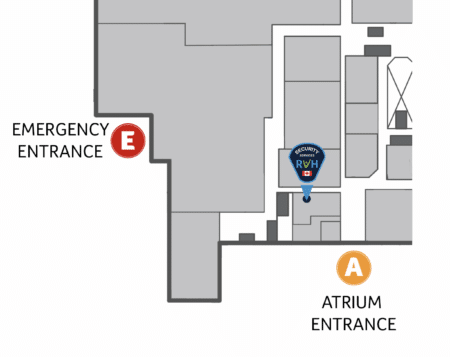
- Please refer to your onboarding email for information regarding your computer access login and temporary password
- You will receive an additional email with computer training details if you require access to any of the hospital medical record software
- Please complete this Parking Form and submit directly to the Parking pay station/office, located at the west side of the Main visitor parking lot
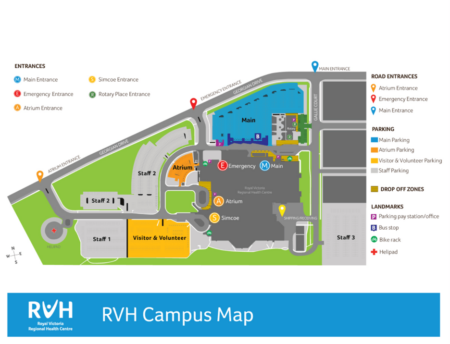
FAQs
What do I need to wear?
- Please follow any dress code outlined by your academic institution for student placements. Business casual is acceptable for students not requiring scrubs.
- RVH Identification Badge and Staff Alert Pendant must be worn at all times
RVH’s full Corporate Dress Code policy can be found on RVH’s intranet
Is there somewhere to eat on site?
- There is a Food Court on the first floor as well as the auxiliary run Café Royale located at the main entrance outside of the Cancer Centre. Click here for locations and hours
Are there lockers for students?
- RVH provides students with locker facilities located men/women’s change rooms. If you are using a locker in the men/women’s change room. Please note that students must provide their own (high quality) lock, and ensure that the lock is removed at the end of each tour of duty (clinical day). We encourage students not to bring valuables to our health centre. We would also recommend that students share lockers.
- Locker numbers available in female change room for students: 137, 138, 139, 140, 141, 142, 143, 144, 145, 146, 147, 148, 149, 150, 153.
- Locker numbers available to male change room for students: 150, 151, 152, 153,154, 155, 156, 157, 158.
- Additional half lockers are also available on Level 1. (Take the main elevators to level 1 and turn right). Locker numbers are 802-849
What entrance should I use?
Enter through the RVH Main Entrance located off Gallie Court. For all subsequent visits you will enter through the Simcoe Entrance.
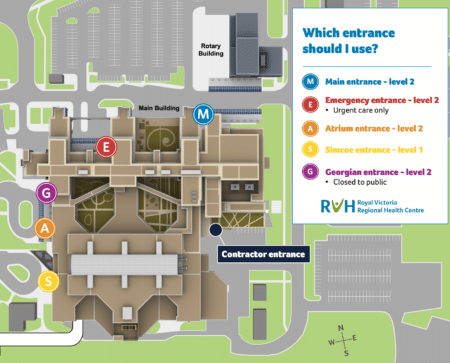
What if I am not able to attend my computer training?
- Contact the RVH student placement coordinators at students@rvh.on.ca to ask about other options.
What if I cannot attend my placement?
- Please follow the procedure for absence as outline by your academic institution.
Do I need to submit my Onboarding documents if I am already RVH Staff?
- Yes, you will need to submit all required student placement onboarding documents regardless of current or past employment with RVH. You will be provided separate student/clinical instructor network access and student/clinical instruction id badge that must be used when at RVH for student placement hours. You may not use your RVH employee access or badge for any student activities, including employees working the capacity of a clinical instructor for an academic institution.
I am a clinical instructor for a group of students. Can I access the Automated Dispensing Unit (ADU) for my students?
- As a clinical instructor, you will be provided access to the ADU. Please make an appointment with the RVH Student Placement Coordinator to have you biometrics enrolled in the ADU. Your ADU access will expire at the end of each placement and need to re-enrol at the beginning of the next placement that you are assigned to. As a reminder, Clinical Instructors do not administer narcotics. Note: If you are also and RVH employee, you will be provided with a second ADU access/biometrics to use on the days that you are here as a clinical instructor.
How can I access RVH Sharepoint to view Policies and Procedures, the Parenteral Drug Manual, and other documents?
- To access the RVH intranet please enter your Network mnemonic plus @rvh.on.ca Example: If your name is Jane Smith and your Network mnemonic was smithj you would enter smithj@rvh.on.ca to access the RVH intranet. Once on the RVH intranet you will be able to access numerous resources available to staff and students.
Additional Resources
Thank you for dedicating your time and expertise in assisting the professional development and clinical growth of students during their clinical placement at RVH. Your willingness to share your knowledge and experience is greatly appreciated.
Whether it is your first time precepting, or you are looking for resources, below are some ways to grow and develop as a preceptor:
Preceptor Education Program (PEP) – preceptor.ca
This online self-guided program developed in collaboration with Western University Health Sciences, Fanshawe College, McGill University, and the Council of Ontario University consists of 8 interactive modules designed to support preceptors in health professions. You will receive a printable certificate once you have completed all 8 modules.
Clinical Skills Preceptors – available 7 days a week
Our Clinical Skills Preceptors are trained to support you as a preceptor. They can help with providing feedback, determining learning goals, or guidance with student assignments in real time, at the bedside.
In the Emergency Department: call 705-627-2833
Hospital Wide: call 705-627-3972
RVH Mentorship Program
Mentor training is available to RVH nursing staff looking to support new nurses at RVH. This program supports not only clinical skills, but also psychosocial support. Topics include supporting crucial conversations, accountability, stress management, providing feedback, and resource finding.
To apply to be a mentor please complete The Expression of Interest Form *Please note Mentor Training is currently open to RVH nursing staff, with plans to expand organizationally soon!
- Create an environment to decrease anxiety and enhance learning (e.g., give positive feedback; reassure student that you are ultimately responsible for client’s care; reinforce their sense of competency by reminding them of their nursing experience to date);
- Role model (e.g., demonstrate components of physical exam; joint discharge planning with a patient);
- Use charting to teach;
- Use detailed, guided questioning with the student (helps student to focus and to give a rationale for actions taken). Indicators of student readiness for increased responsibility
- There is a mutual increase in comfort, almost intuitive; a mutual decision;
- Trust is built between you and the student; helps student to not get in over her/his head and to be responsible for her/his own actions and decisions;
- Student proves she/he will not miss anything important;
- There is no longer a need to review every detail with the preceptor;
- Student has proven physical assessment skills.
- Student gives accurate clinical presentation of significant positives and negatives;
- Data presented by student proves she/he has covered all bases with the patient;
- Student shows ability to tie in past experience with new skills and apply them to new scenarios;
- Student recognizes limits of knowledge; admits to weaknesses;
- Student asks appropriate questions;
- Student becomes a self-starter; can cope with an unstructured setting or a change in schedule;
- Student asks for more challenging experience; exhibits confidence

